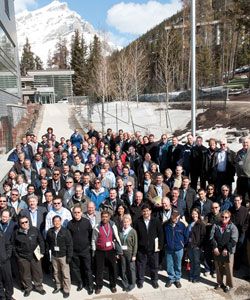Beyond Scorecarding: An eager network of utilities helps to track national performance.
In the late 1990s, David Main and his team at AECOM realized that Canada had only anecdotal information about water and wastewater utility performance. They also realized they could correct the deficit. “We rolled up our sleeves and began,” Main remembers. “It turned out to be more complicated than we initially thought.”
Years later, the hard work has paid off. Today, the National Water and Wastewater Benchmarking Initiative (NWWBI) boasts 45 Canadian water and wastewater utilities, cities, and regional organizations, which represents approximately 70 per cent of the nation’s population.
Through the program, members work closely with AECOM to conduct hundreds of detailed site visits and rigorously maintain accurate data for over 70 performance indicators in water treatment and distribution, wastewater collection and treatment, and stormwater systems. Going beyond scorecarding is a major goal, says Main. “It’s a powerful information base. We use it to make decisions around daily operations.”
One of the more complicated tasks has been coming up with specific definitions to ensure that participants are on the same page. “This project is 90 per cent communication,” says Main. “Our benchmarking has a common glossary, so nobody has to spend time explaining what they mean by certain terms. This way, somebody in Burnaby can speak to someone in Waterloo and get started right away—it’s all the same language and the same numbers.”
Having a national network of peers, says Main, is invaluable. At least once per year, these peers meet each other at a three-day workshop to review case studies and discuss annual results. As the NWWBI becomes more popular, he adds, part of the challenge is keeping the workshop from becoming a conference.
Outside of its membership, the NWWBI has proven extremely useful. When the Canadian Council of Ministers of Environment (CCME) began to work on regulations for the Canada-wide Strategy for the Management of Municipal Wastewater Effluent, not much data was publicly available. One NWWBI participant suggested providing blind access to the database so the CCME could see what existed. “That worked very well,” says Main. “We now cooperate with Statistics Canada, the Canadian Water and Wastewater Association, and provincial associations to make sure they have access.”
Despite sharing information with these partners, Main says there’s value in remaining unregulated. “If you make participation mandatory, you get utilities that don’t want to be there and increase the chances of getting bad data,” he explains. Currently, members pay a flat subscription fee, which includes the results, the workshops, and access to a help desk.
“The onus is on AECOM to keep the vision of the project going. As long as we’re providing a valuable product and service, the utilities will be interested.” — Kerry Freek


